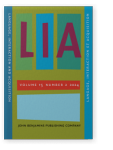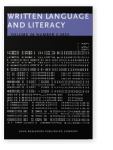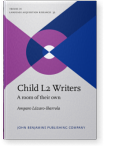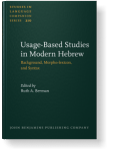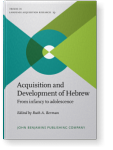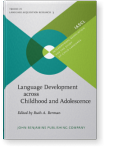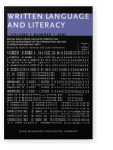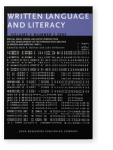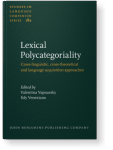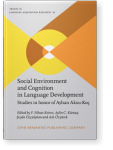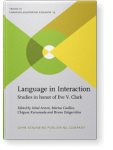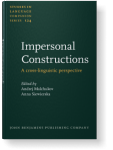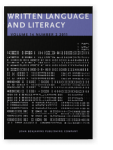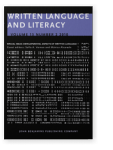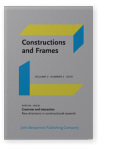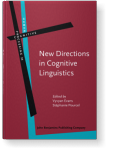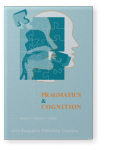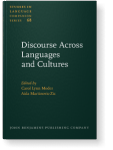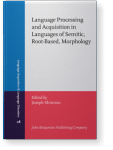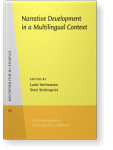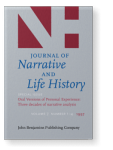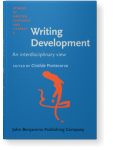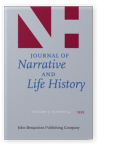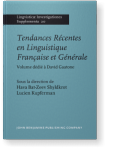Ruth A. Berman
List of John Benjamins publications for which Ruth A. Berman plays a role.
Journals
Book series
Usage-Based Studies in Modern Hebrew: Background, Morpho-lexicon, and Syntax
Edited by Ruth A. Berman
[Studies in Language Companion Series, 210] 2020. xviii, 682 pp.
Subjects Afro-Asiatic languages | Theoretical linguistics
Acquisition and Development of Hebrew: From infancy to adolescence
Edited by Ruth A. Berman
[Trends in Language Acquisition Research, 19] 2016. xvii, 404 pp.
Subjects Afro-Asiatic languages | Language acquisition | Theoretical linguistics
Language Development across Childhood and Adolescence
Edited by Ruth A. Berman
[Trends in Language Acquisition Research, 3] 2004. xiv, 308 pp.
Subjects Language acquisition
Cross-Linguistic Perspectives on the Development of Text-Production Abilities in Speech and Writing. Part 1
Edited by Ruth A. Berman and Ludo Verhoeven
Special issue of Written Language & Literacy 5:1 (2002) iv, 135 pp.
Subjects Discourse studies | Pragmatics | Writing and literacy
Cross-Linguistic Perspectives on the Development of Text-Production Abilities in Speech and Writing. Part 2
Edited by Ruth A. Berman and Ludo Verhoeven
Special issue of Written Language & Literacy 5:2 (2002) iv, 172 pp.
Subjects Discourse studies | Pragmatics | Writing and literacy
2020 Chapter 14. Genitive (smixut) constructions in Modern Hebrew Usage-Based Studies in Modern Hebrew: Background, Morpho-lexicon, and Syntax, Berman, Ruth A. (ed.), pp. 507–538 | Chapter
The chapter concerns the morpho-syntactic structure and usage-based properties
of MH constructions involving two nominal constituents, an initial head and following
modifier. Focus is on the three smixut ‘adjacency’ or ‘dependency’
constructions: (i) “construct-state” compounds in the form N^ N(P),… read more
2020 Chapter 11. Nominalizations Usage-Based Studies in Modern Hebrew: Background, Morpho-lexicon, and Syntax, Berman, Ruth A. (ed.), pp. 375–418 | Chapter
The chapter details structural and usage-based properties of three types of
verb shifts to nouns in MH: Action Nominals. Gerunds, and Infinitives. It starts by
specifying morphological and syntactic criteria for these three constructions as
nominalizations: They are fully productive grammatical… read more
2020 Introduction Usage-Based Studies in Modern Hebrew: Background, Morpho-lexicon, and Syntax, Berman, Ruth A. (ed.), pp. 1–16 | Chapter
2020 Chapter 9. Parts of speech categories in the lexicon of Modern Hebrew Usage-Based Studies in Modern Hebrew: Background, Morpho-lexicon, and Syntax, Berman, Ruth A. (ed.), pp. 265–330 | Chapter
Parts of speech in Modern Hebrew are analyzed in relation to three categories:
Open Class items (Nouns, Verbs, Adjectives), Closed Class paradigmatically organized
grammatical items (e.g., Pronouns, Case-Markers, Conjunctions), and Intermediate elements
lying between the two (e.g., Prepositions,… read more
2017 Word class distinctiveness versus polycategoriality in Modern Hebrew: Typological and psycholinguistic perspectives Lexical Polycategoriality: Cross-linguistic, cross-theoretical and language acquisition approaches, Vapnarsky, Valentina and Edy Veneziano (eds.), pp. 343–377 | Chapter
The paper deals with word-formation devices in Modern Hebrew as reflecting word-class distinctiveness rather than polycategoriality, defined here as characterizing lexical items that share the same surface morpho-phonological form, yet function in different lexico-grammatical categories. Relevant… read more
2017 Chapter 13. Developing construals of a narrative event sequence Social Environment and Cognition in Language Development: Studies in honor of Ayhan Aksu-Koç, Ketrez, F. Nihan, Aylin C. Küntay, Şeyda Özçalışkan and Aslı Özyürek (eds.), pp. 199–222 | Chapter
The chapter examines Hebrew-language excerpts relating to a particular episode in the “frog-story” picture book following on from Aksu-Koç and Tekdemir’s (2004) study of “the interplay between narrativity and mindreading.” Verbalizations of Hebrew-speaking preschoolers and school children… read more
2016 Typology, acquisition, and development: The view from Israeli Hebrew Acquisition and Development of Hebrew: From infancy to adolescence, Berman, Ruth A. (ed.), pp. 1–38 | Article
This introductory chapter presents background on the typology, acquisition, and development of Israeli Hebrew in order to provide a shared frame of reference for readers’ perusal of the eleven chapters that follow. It starts by defining the overall goal of the volume, followed by an overview of… read more
2014 Emergent clause-combining in adult-child interactional contexts Language in Interaction: Studies in honor of Eve V. Clark, Arnon, Inbal, Marisa Casillas, Chigusa Kurumada and Bruno Estigarribia (eds.), pp. 281–300 | Article
The study analyzes early clause-combining (CC) complex syntax of three Hebrew-acquiring girls in self-initiated autonomous constructions compared to three types of interlocutor-supported contexts – by means of Affirmations (encouraging comments), Scaffolding (structural prompts), and… read more
2011 Revisiting impersonal constructions in Modern Hebrew: Discourse-based perspectives Impersonal Constructions: A cross-linguistic perspective, Malchukov, Andrej L. and Anna Siewierska (eds.), pp. 323–356 | Article
The study focuses on three impersonal constructions in Modern Hebrew: subjectless sentences with 3rd person plural main verbs, subjectless sentences with modal operators that take a complement clause, and sentences with generic pronoun subjects. Structural and semantic analyses elaborate on earlier… read more
2011 Linguistic diagnostics of written texts in two school-age populations Written Language & Literacy 14:2, pp. 161–187 | Article
The paper considers the writing abilities of Hebrew-speaking grade school and middle school students from mid-high compared with low SES backgrounds, as reflected in stories and compositions they wrote on the topic of friendship. A range of linguistic means of expression were employed as… read more
2010 The lexicon in writing–speech-differentiation Developmental aspects of written language, Vernon Carter, Sofía A. and Mónica Alvarado (eds.), pp. 183–205 | Article
The study analyzed text-embedded lexical usage as diagnostic of writing-speech-distinctions in stories and discussions produced in the two modalities by English-speaking grade-school children, middle-school pre-adolescents, high-school adolescents, and adults. We assumed that (1) while children… read more
2010 Parts of speech as constructions: The case of Hebrew “adverbs” Grammar and interaction: New directions in constructional research, pp. 242–274 | Article
The paper re-appraises accepted classifications of linguistic elements into word-level constructions on the one hand and in terms of Parts-of-Speech systems on the other from the point of view of Construction Grammar (CxG). We focus on a particular adverbial construction in Hebrew, with the… read more
2009 Cognitive and linguistic factors in evaluating text quality: Global versus local? New Directions in Cognitive Linguistics, Evans, Vyvyan and Stéphanie Pourcel (eds.), pp. 421–440 | Article
2009 Developing linguistic register across text types: The case of modern Hebrew Pragmatics & Cognition 17:1, pp. 108–145 | Article
The study considers the topic of linguistic register by examining how schoolchildren, adolescents, and adults vary the texts that they construct across the dimensions of modality (spoken/written discourse) and genre (narrative/expository discourse). Although register variation is presumably… read more
2004 Genre and modality in developing discourse abilities Discourse Across Languages and Cultures, Moder, Carol Lynn and Aida Martinovic-Zic (eds.), pp. 329–356 | Article
2004 Between emergence and mastery: The long development route of language acquisition Language Development across Childhood and Adolescence, Berman, Ruth A. (ed.), pp. 9–34 | Chapter
2003 13. Children’s lexical innovations: Developmental perspectives on Hebrew verb structure Language Processing and Acquisition in Languages of Semitic, Root-Based, Morphology, Shimron, Joseph (ed.), pp. 243–291 | Chapter
2002 Cross-linguistic perspectives on the development of text-production abilities: Speech and writing Cross-Linguistic Perspectives on the Development of Text-Production Abilities in Speech and Writing. Part 1, Berman, Ruth A. and Ludo Verhoeven (eds.), pp. 1–43 | Article
The studies reported in this volume of WL&L (5: 1–2, 2002) all derive from a joint project entitled “Developing literacy in different contexts and in different languages”, funded by the Spencer Foundation, Chicago. The study encompasses seven languages — Dutch, English, French, Hebrew, Icelandic,… read more
2002 Discourse stance: Written and spoken language Cross-Linguistic Perspectives on the Development of Text-Production Abilities in Speech and Writing. Part 2, Berman, Ruth A. and Ludo Verhoeven (eds.), pp. 255–289 | Article
The aim of this article is to integrate findings reported in the preceding articles in this collection, employing a global discourse perspective labeled discourse stance. The paper attempts to clarify what is meant by this notion, and how it can contribute to the evaluation of text construction… read more
2002 Propositional attitudes in written and spoken language Cross-Linguistic Perspectives on the Development of Text-Production Abilities in Speech and Writing. Part 2, Berman, Ruth A. and Ludo Verhoeven (eds.), pp. 183–218 | Article
This study considers the use of modal expressions (auxiliaries like should
,
can), semi-modals (e.g. have to, be likely to), and adverbials and complement-taking expressions (maybe, it is possible that ) to convey the attitudes and feelings of speaker/writers about the events they describe… read more
2001 16. Narrative development in multilingual contexts: A cross-linguistic perspective Narrative Development in a Multilingual Context, Verhoeven, Ludo and Sven Strömqvist (eds.), pp. 419–428 | Chapter
2001 11. Linguistic features of Spanish-Hebrew children’s narratives Narrative Development in a Multilingual Context, Verhoeven, Ludo and Sven Strömqvist (eds.), pp. 277–318 | Chapter
1997 4. Presschool Knowledge of Language: What Five year olds Know about Language Structue and Language
Use Writing Development: An interdisciplinary view, Pontecorvo, Clotilde (ed.), pp. 61–76 | Chapter
1995 Narrative Competence and Storytelling Performance: How Children Tell Stories in Different Contexts Journal of Narrative and Life History 5:4, pp. 285–313 | Article
Abstract This study addresses some of the multiple factors that play a role in children's developing narrative abilities. It starts by reviewing approaches to narrative analysis that have had an impact on the study of children's narratives since the 1970s. Such analyses are reevaluated from a… read more
1995 Aspects of Hebrew/English contrastive Rhetoric Tendances Récentes en Linguistique Française et Générale: Volume dédié à David Gaatone, Bat-Zeev Shyldkrot, Hava et Lucien Kupferman (dir.), pp. 41–54 | Article
